2003 Toyota Tacoma Service, Tires & Repairs
Get Started
Complete Auto Care for Your 2003 Toyota Tacoma
-
TIRES FOR YOUR 2003 Toyota Tacoma View Tire Info GET TIRE PRICING
-
REPAIR FOR YOUR 2003 Toyota Tacoma View Repair Info SCHEDULE REPAIR
-
MAINTENANCE FOR YOUR 2003 Toyota Tacoma View Maintenance Info SCHEDULE MAINTENANCE
-
OFFERS FOR YOUR 2003 Toyota Tacoma Limited Time Tire Offers VIEW ALL COUPONS
2003 Toyota Tacoma Tires
Recommended Tires | Tire Information
2003 Toyota Tacoma Tires Sizes, Speed Ratings, and Inflation
Not sure about your 2003 Toyota Tacoma tire size? Use the following chart to find information on tire size, speed rating, and inflation.
| Trim Level | Speed Rating | Inflation in PSI F/R | Tire Size |
|---|---|---|---|
| 2003 Toyota Tacoma S-Runner | T | 29 PSI/32 PSI | P235/55R16 |
| 2003 Toyota Tacoma Base* | S | 26 PSI/29 PSI | P225/75R15 |
| 2003 Toyota Tacoma Base* | T | 29 PSI/32 PSI | P235/55R16 |
| 2003 Toyota Tacoma Base* | S | 26 PSI/29 PSI | P265/70R16 |
| 2003 Toyota Tacoma Base* | S | 29 PSI/29 PSI | P205/75R15 |
| 2003 Toyota Tacoma Base* | S | 26 PSI/26 PSI | P265/70R16 |
| 2003 Toyota Tacoma Pre Runner* | S | 26 PSI/26 PSI | P265/70R16 |
| 2003 Toyota Tacoma Pre Runner* | S | 26 PSI/29 PSI | P265/70R16 |
| 2003 Toyota Tacoma Pre Runner* | S | 26 PSI/29 PSI | P225/75R15 |
|
2003 Toyota Tacoma S-Runner Speed Rating: T Inflation F/R: 29 PSI/32 PSI |
|
2003 Toyota Tacoma Base* Speed Rating: S Inflation F/R: 26 PSI/29 PSI |
|
2003 Toyota Tacoma Base* Speed Rating: T Inflation F/R: 29 PSI/32 PSI |
|
2003 Toyota Tacoma Base* Speed Rating: S Inflation F/R: 26 PSI/29 PSI |
|
2003 Toyota Tacoma Base* Speed Rating: S Inflation F/R: 29 PSI/29 PSI |
|
2003 Toyota Tacoma Base* Speed Rating: S Inflation F/R: 26 PSI/26 PSI |
|
2003 Toyota Tacoma Pre Runner* Speed Rating: S Inflation F/R: 26 PSI/26 PSI |
|
2003 Toyota Tacoma Pre Runner* Speed Rating: S Inflation F/R: 26 PSI/29 PSI |
|
2003 Toyota Tacoma Pre Runner* Speed Rating: S Inflation F/R: 26 PSI/29 PSI |
* Note: these models have different tire sizes depending on vehicle options.
Recommended Tires for Your 2003 Toyota Tacoma
What tires are best for a 2003 Toyota Tacoma? Check out the following tire brands and types.
 ALENZA AS ULTRA
ALENZA AS ULTRA
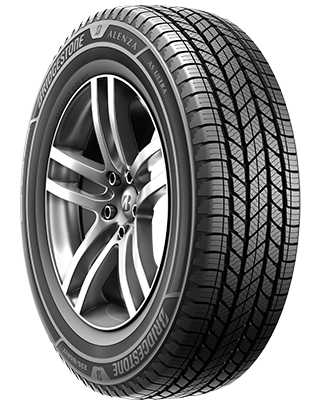
- No warranty
- All-Season
- Light Truck Tires
 Blizzak DM-V2
Blizzak DM-V2
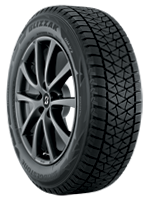
- No warranty
- Winter
- Winter
 Dueler A/T Revo 3
Dueler A/T Revo 3
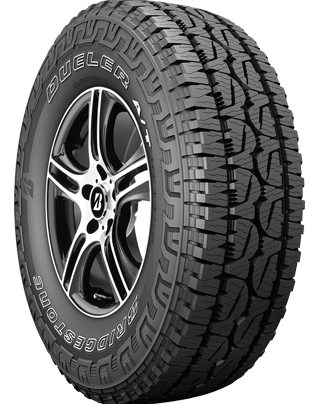
- Platinum Pact Limited Warranty
- All-Season
- Light Truck Tires
 Destination LE3
Destination LE3
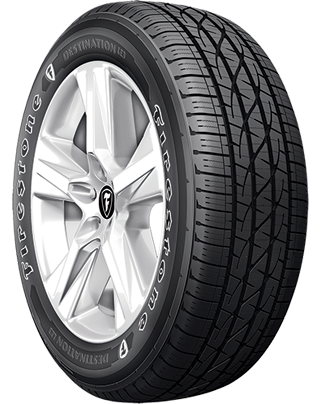
- No warranty
- All-Season
- Light Truck Tires
 Destination A/T2
Destination A/T2
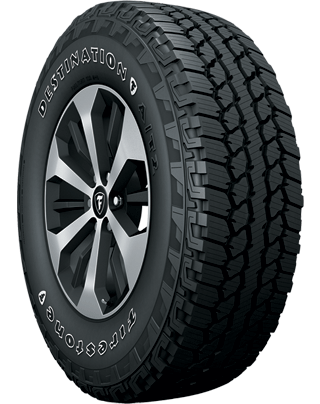
- Gold Pledge Limited Warranty
- All-Season
- Light Truck Tires
 Winterforce 2 UV
Winterforce 2 UV
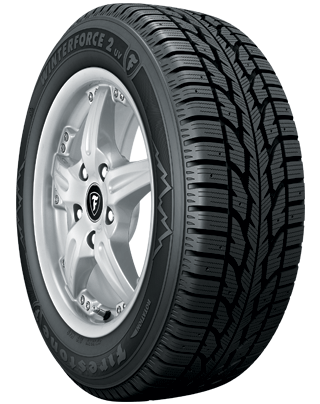
- No warranty
- Winter
- Winter

- No warranty
- All-Season
- Passenger Tires
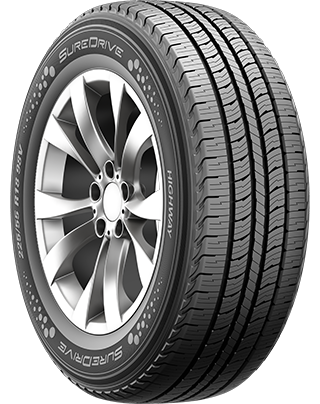
- No warranty
- All-Season
- Light Truck Tires
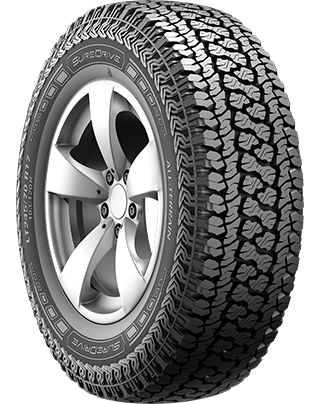
- No warranty
- All-Season
- Light Truck Tires
 Extensa A/S II
Extensa A/S II

- No warranty
- All-Season
- Passenger Tires
 OPEN COUNTRY A/T III
OPEN COUNTRY A/T III
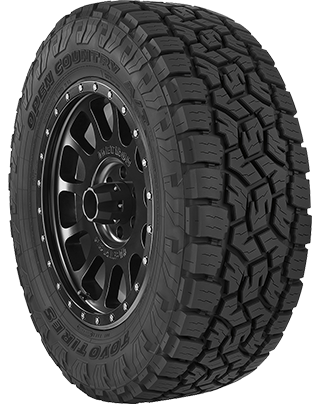
- No warranty
- All-Season
- Light Truck Tires
2003 Toyota Tacoma Tire Information
Other than getting the proper tire size, you also want to consider a handful of other factors when buying new Toyota Tacoma tires like where and how you drive, and what tire brand you trust most. Think about where you live (countryside vs. city vs. mountains) and the kind of unexpected weather you're likely to experience when evaluating your driving conditions. Many drivers who live in states that experience all four seasons choose to purchase two sets of tires: one set for winter, one set for summer. Other drivers prefer to purchase one all-season set to limit trips to the tire shop and make sure their vehicle is prepared in the rain, sleet, snow, or sun!
Next, consider your driving style. If you're a big off-roading fan who forges paths where others can't, you have very different needs than a long-distance commuter who sticks to the highway. Visit your local Firestone Complete Auto Care for help selecting the tire that's right for you, or get started by browsing tires that fit your Toyota Tacoma.
Toyota Tacoma Installation and More
We sell tires, but we also service them and care for all the around-the-wheel components. We're your one-stop shop for tire installation, rotation, and ongoing maintenance! Shop 2003 Toyota Tacoma tires online and schedule an installation appointment.
2003 Toyota Tacoma Tire Questions
-
Why check Toyota tire inflation? A small decrease in tire pressure can have a big impact on your driving. Maintaining proper tire pressure can help improve braking time, increase fuel economy, and boost tire lifespan.
-
Why are there numbers on the side of my Toyota Tacoma tires? The numbers on your tire sidewall give you information about tire speed rating, traction, treadwear, tire size, and load carrying capacity. Chat with a tire technician to learn how to read the numbers on your Toyota tires!
-
How do I check the tread depth on my Toyota tires? Stay on top of your tire tread depth to help avoid a dangerous drive. You can check tread depth with a penny. Hold the penny so that Abraham Lincoln is facing you, then place your penny into a tread groove upside down. If you can see the top of Abe’s head, your tread is shallow and it might be time for new Toyota Tacoma tires. Grab a penny. Hold the so that Abe Lincon's head is facing you and his hair is pointing toward the ground. Then, place the penny into a tread groove. If you can see the top of Abe’s head, your tread is shallow and it might be time for new Toyota Tacoma tires.
Repair Services for Your 2003 Toyota Tacoma
How do I learn more about auto repairs? Click on a service below to read about the types of Toyota Tacoma repairs we do at Firestone Complete Auto Care.
Get Repairs for Your 2003 Toyota Tacoma
Car repairs: for many drivers, that phrase is a dreadful one. We’re here to change that, though. At Firestone Complete Auto Care, we want to make car repair painless and hassle-free. When it’s time for 2003 Toyota Tacoma repair services, head to your nearest Firestone location and our technicians will take care of your Tacoma like it was their own. We'll work to evaluate the scope of repairs needed and explain your options. We’ll never recommend a repair we don’t think is necessary for your safety or the performance of your Toyota.
What Will Toyota Tacoma Repairs Cost?
The cost to repair your 2003 Toyota Tacoma depends on which repairs are needed, the cost of any replacement parts, the amount of labor necessary to get the job done, and your locale. No matter what state you’re in, be sure to look through our offers and online coupons for repairs.
A few different aspects can influence repair costs for your 2003 Toyota Tacoma, like
2003 Toyota Tacoma Auto Repair Q&A
-
Do I still need scheduled maintenance even when nothing is wrong with my Toyota? The cheapest 2003 Toyota Tacoma repair is the one that isn’t necessary in the first place! Staying up-to-date with your car’s scheduled maintenance services is a great way to keep future repair costs low.
-
What does it mean to be 'in tune' with your car? No, we’re not talking about finding the best jams on the radio! You know your car best, and you’re the first person who will notice if something doesn’t feel right (like new smells, sights, or sounds coming from your car). If you sense that something is 'off,' stop in for a Courtesy Check to have these symptoms checked out ASAP. Early action could help you prevent Toyota Tacoma repairs.
-
Do I have to get the repairs you recommend for my Toyota? Trust is more than just a saying on the wall. It’s a window underneath it. That’s why we won’t recommend services or repairs for your 2003 Toyota Tacoma unless we think they’re vital to your safety on the road.
Brake Repair for Your 2003 Toyota Tacoma
You might have a strong and reliable engine in your Toyota Tacoma. But if you can’t brake, it might as well be scrap metal. Don't wait if you're experiencing brake squeaks or a loss of braking power. Safe driving and responsive brakes go hand in hand. Plus, waiting can lead to more expensive parts wearing out and requiring replacement. Go to your local Firestone Complete Auto Care for 2003 Toyota Tacoma brake repairs. Our brake repair services include pad/shoe replacement, brake rotor/drum resurfacing, brake fluid exchange, and wheel cylinder and brake caliper installation.
Toyota Tacoma Brakes Questions
-
Why is my Tacoma shaking as I brake? If your Tacoma shakes when you brake, you could be dealing with warped rotors, faulty brake calipers, worn brake pads or rotors, or loose or worn suspension parts. Schedule a free brake inspection at Firestone Complete Auto Care for help diagnosing your brake issue.
-
How long should my Tacoma brake pads last? Brake pads generally last between 30,000 and 40,000 miles. Your driving can affect how long your Tacoma brake pads last, though. For example, mainly driving on highways and gradually braking can help increase the lifespan of your brake pads, and carrying hefty loads or riding your brakes can shorten it.
-
Is it bad if my Tacoma is leaking brake fluid when off? Your Tacoma has a closed hydraulic brake system, meaning you should not have a brake fluid leak under normal conditions. However, parts of your brake system can wear out over time or become damaged, which can lead to a brake fluid leak.
2003 Toyota Tacoma Drivetrain Repairs
Drivetrains for front, rear, and all-wheel-drive and 4WD vehicles are not all the same. You don't want to go to any random shop for drivetrain repair. You want to come see the technicians at Firestone Complete Auto Care. We can help repair all of your 2003 Toyota Tacoma drivetrain components Your Tacoma might need driveshaft repair if you notice clunks when shifting, vibration as your vehicle accelerates, resistance when turning, or heavy vibrations in your floorboards.
2003 Toyota Tacoma Drivetrain Questions
-
How do I know if my Toyota drivetrain is damaged? Noises toward the back of your Toyota Tacoma, leaking fluid, trouble turning — these could all be signs of drivetrain damage you want to address. Take action before something more severe happens.
-
What causes a Tacoma’s malfunction indicator light (MIL) to illuminate? If your Tacoma has its malfunction warning light (more commonly called the check engine light) illuminated, it could indicate engine troubles, problems with the transmission, electrical issues, malfunctioning sensors, connector problems, or misfire issues.
-
How concerning is a drivetrain malfunction in my Tacoma? Don't ignore a drivetrain malfunction in your Tacoma. As soon as you notice a problem, have it checked by a professional mechanic to diagnose the issue and carry out any necessary repairs. Driving with a faulty drivetrain is risky and may further damage your Tacoma.
2003 Toyota Tacoma Alignment Services
An alignment involves making adjustments to your Toyota Tacoma's suspension system, which connects the wheels with the rest of the vehicle. In an alignment service, calculated changes are made to the angles of your tires. This is so that your tires hit the road at an optimal angle for your vehicle’s performance — just as Toyota intended. When you bring in your 2003 Toyota Tacoma, we’ll perform an alignment check first. Then, we’ll adjust the angles as needed until they match recommended measurements from Toyota.
Questions About Toyota Tacoma Alignment
-
How can I avoid knocking my Toyota Tacoma out of alignment? When it’s safe to do so, avoid driving over potholes or hitting curbs. These road obstacles can wreak havoc on your wheel alignment, as can wear and tear from rough road conditions.
-
When should you get a wheel alignment for your Tacoma? Generally, it’s wise to have your alignment looked at around every 6,000 miles or 6 months, whichever happens first. You should check your Tacoma owner’s manual to verify Toyota’s suggested interval.
-
Does getting new Tacoma tires mean you need an alignment? It’s not mandatory to get an alignment after installing new tires on your Tacoma, but it can be a smart decision! Proper alignment from the jump can help improve handling, fuel efficiency, and tire wear.
2003 Toyota Tacoma Engine Repair
If your 2003 Toyota Tacoma needs engine repair, our expert techs will let you know what needs to be done and why before they get started. We make recommendations, but you make the final decision. If a service can wait, we’ll make sure you know. We'll also tell you if it's necessary for your safety. We seek to give you all the info you need to make a smart decision about our services. Turn to Firestone Complete Auto Care for your 2003 Tacoma engine repairs and you can feel good knowing that we only use Toyota-compliant replacement parts such as the timing chain or belt, valve guide seal, fuses, or another part.
2003 Toyota Tacoma Engine Q&A
-
Why does my Tacoma’s check engine light come on when I start it? Generally, your check engine light turning on upon ignition is not a bad thing. It’s just your Tacoma firing up its circuits. The light should turn off in a bit, but come see us if it doesn't.
-
Why is my Toyota Tacoma making engine noise? Unusual noises can signal a problem with your Toyota Tacoma engine. Tapping or knocking could mean you're low on oil. Whistling could mean a belt is misaligned or there's an intake leak. Squealing can indicate a loose fan belt, and grinding might be coming from the brakes, not the engine.
-
What could damage a Toyota engine? Certain driving habits can hurt your engine. These habits include driving on an empty fuel tank, revving your engine while the vehicle is in Park, or slamming the gas pedal while the engine is still cold. Steer clear of these habits to help protect engine performance and efficiency.
Get Your Toyota Tacoma Tire Repaired
Firestone Complete Auto Care is here for you when your 2003 Toyota Tacoma needs flat tire repair or inspection. There’s a chance your tire could be plugged and patched (rather than replaced). Our technicians can inspect your tire and let you know if it is safe to repair. We’ll begin by taking a look at where the damage is, the type and extent of the tire damage, and how all of your tires are wearing.
If your 2003 Toyota Tacoma tire puncture can be repaired, we’ll get to work on the steps to fix it: (1) Separate the tire from the vehicle wheel, (2) fill the puncture to keep the moisture out, and (3) re-seal the inside lining of your tire so that air won’t escape.
Your Questions About Toyota Tacoma Tire Repair, Answered
-
What happens if I drive my Toyota on a flat tire? Driving on a flat or underinflated tire can put extra stress on your wheels and alignment. While it’s sometimes necessary to drive a short distance on a flat tire to get to a safe place, don’t take any other trips in your Tacoma until you can have the flat tire repaired or replaced.
-
Is temporary sealant bad for my Toyota's tires? A temporary sealant may be able to help you get to a repair location safely. But temporary or emergency sealants could possibly damage TPMS sensors, and in some cases may even void the warranty on your Bridgestone or Firestone tires. If your tire needs extensive repair, sealant can add time and labor costs to the process.
-
Why do my Tacoma tires keep losing air? If your Tacoma tires are always losing air, you may have a puncture, damaged wheel, or leaking valve stem.
Maintenance for Your 2003 Toyota Tacoma
You want your Toyota Tacoma to last as long as possible. If you put in the effort to keep up with proper maintenance, you could hit 200,000 miles (or beyond!) in your Tacoma.
2003 Toyota Tacoma Maintenance Information
It can be overwhelming, but fortunately, there’s a resource that takes the guesswork out of routine Tacoma maintenance. Just follow your 2003 Toyota Tacoma maintenance schedule! This recommended maintenance schedule is written by the auto manufacturer, Toyota themselves. Driving conditions, climate variations, and other variables can affect which scheduled maintenance services you’ll need; however, recommended maintenance usually includes services like fluid exchanges, filter changes, new brake pads, oil changes, and tire rotations. Scheduling routine service appointments is one of the best ways to help extend your Tacoma's life, increase your vehicle safety, and help you avoid expensive repairs caused by 2003 Toyota Tacoma problems later.
Learn About Vital Maintenance Needs for Your Toyota Tacoma
Come to Firestone Complete Auto Care for manufacturer-recommended routine maintenance on your 2003 Toyota Tacoma and a skilled technician will start the appointment with a Courtesy Check. This Courtesy Check can establish a baseline of what may need to be addressed during your service appointment. Every Courtesy Check will include a visual inspection of your Tacoma. We’ll check your head and tail lights, fluid levels, filters, tires (and their alignment!), and windshield wiper blades. We’ll also perform a free battery check to determine your battery’s charge level.
Firestone Complete Auto Care is your one-stop shop for 2003 Toyota Tacoma maintenance and repairs. We can help you keep your vehicle (and your life!) running smoothly. Many of our locations have weekend and evening hours for your convenience.
2003 Toyota Tacoma Maintenance Q&A
-
What do I do if I hit a pothole in my Toyota Tacoma? Check your car for pothole damage! If you’ve recently hit a pothole (or even if you don’t remember hitting one… they can be sneaky!) check your tire treads, tire sidewalls, and wheels for damage. Potholes can also knock your car out of alignment, so have your alignment checked if you suspect you’ve driven over a rough patch of road lately.
-
When should I switch my Toyota Tacoma to high mileage oil? Do you have more than 75,000 miles on your Toyota Tacoma? If so, request to switch to high mileage oil at your next oil change. This type of oil is specially formulated to keep aging engine parts in the best possible condition.
-
Can I ignore dashboard lights on my Toyota? It's better to get them addressed as soon as possible. An illuminated dashboard light means something in your vehicle isn't functioning like it should. Letting problems linger can mean bad news for your Toyota Tacoma, so be sure to take your car in for service as soon as you notice an illuminated dashboard light.
Battery Size & Replacement for 2003 Toyota Tacoma
Researching battery replacements for your Toyota Tacoma?
| Battery | Engine | Warranty | Cold Cranking Amps | |
|---|---|---|---|---|
| 24F-3 | L4/2.7L | Replacement 24 months | Performance months | 650 |
| 24F-6 | L4/2.7L | Replacement 36 months | Performance months | 750 |
| 24F-RP | L4/2.7L | Replacement 48 months | Performance months | 750 |
| 24F-3 | V6/3.4L | Replacement 24 months | Performance months | 650 |
| 24F-6 | V6/3.4L | Replacement 36 months | Performance months | 750 |
| 24F-RP | V6/3.4L | Replacement 48 months | Performance months | 750 |
| 35-1 | L4/2.4L | Replacement 24 months | Performance months | 500 |
| 35-2 | L4/2.4L | Replacement 36 months | Performance months | 640 |
| 24F-RP | L4/2.4L | Replacement 48 months | Performance months | 750 |
2003 Toyota Tacoma Car Batteries
On average, auto batteries last anywhere from three to five years. You want to replace your 2003 Toyota Tacoma battery before it fails and leaves you stranded. Pay attention to clues that your battery is on its way out. A lagging starter, an illuminated battery or check engine light, swollen battery case, corroded battery terminals, or dim headlights can all signal that your battery is on its last leg.
You can also get a Free Battery Test at your local Firestone Complete Auto Care. Visit us for a complimentary battery check and, if necessary, a battery replacement to help keep your 2003 Toyota Tacoma running! Automotive batteries are just one of our many areas of expertise. Our expert technicians understand Toyota service recommendations for Tacoma car batteries’ reserve capacities and cold cranking amps. Get help figuring out the battery size that's best for your Tacoma, and schedule an appointment today for a quick car battery replacement.
Top Toyota TacomaCar Battery Questions
-
Why won’t my Toyota Tacoma battery hold a charge? A car battery that needs to be jump-started every time is as good as dead. It may be getting old. Or, you’ve been leaving the doors slightly open and the dome lights on during the night. Stop in for a free battery check at your nearest Firestone Complete Auto Care and learn more about your battery's charge.
-
How long do car batteries last? Car battery lifespan varies depending on a few factors, including driving conditions, accessories, how well it’s maintained, and the type of battery. On average, a car battery lasts about three to five years.
-
What is the white, crusty substance accumulating on my Tacoma’s battery post? If you notice white, crusty stuff around the battery terminals of your Tacoma, it's likely corrosion. A chemical reaction between battery acid and the air can create a white, powdery substance that builds up over time on the terminals. This buildup can interfere with the electrical connection between the battery and your Tacoma’s electrical system, potentially leading to poor performance, difficulty starting, and other issues.
2003 Toyota Tacoma Oil Changes
Your 2003 Tacoma’s oil should be changed according to Toyota’s recommended oil change intervals. No matter the mileage, your Tacoma may need its oil changed ASAP if your check engine light is on, you hear knocking sounds coming from the engine, sense an oil smell in the cabin, or see an excess amount of vehicle exhaust. You may also need an oil change more frequently than Toyota recommends if you haul heavy loads, drive in dusty terrain, enjoy off-roading, or go at low speeds on long distance trips.
Your local Firestone Complete Auto Care has the right 2003 Toyota Tacoma motor oil: either synthetic or conventional. Check your owner's manual and talk with a technician to select the right Toyota Tacoma oil, whether it's Quaker State® Advanced Durability™ conventional oil, Pennzoil® High Mileage Vehicle® motor oil, Pennzoil Platinum® Full Synthetic motor oil with PurePlus™ Technology, or Shell Rotella® heavy-duty engine oil. During your oil change service, one of our techs will change your Tacoma’s oil, replace and recycle the old oil and filter, inspect all of your other filters, top-off essential fluids, and perform a free inspection on the rest of your vehicle. Let the experts take care of your Tacoma’s engine by making an oil change appointment today.
Oil Change Q&A for Your 2003 Toyota Tacoma
-
Why is my Toyota Tacoma oil light illuminated? Your Toyota Tacoma oil change reminder light might illuminate if it’s been too long since your last oil change. On the other hand, the oil pressure light might illuminate due to a clogged oil filter, a faulty oil pressure sensor, low engine oil levels, or a malfunctioning oil pump.
-
How hard is it to change Toyota Tacoma oil at home? Changing engine oil at home isn’t as simple as it’s made out to be. You’ll have to figure out how to properly dispose of the oil and buy special tools. Having your oil changed professionally can not only reduce the risk of something going wrong during the service, but it’ll also help your car perform smoothly down the road.
-
Why is my Toyota exhaust smoke gray or blue? Your engine could be burning oil due to a leak. It may be time for a pro to take a look. A leak can be caused by a variety of issues including faulty valve seals, blown piston rings, or damaged cylinder walls.
Engine Tune-Up Service for Your 2003 Toyota Tacoma
Regular engine tune-ups can optimize your Tacoma’s power on the road. Your local Firestone Complete Auto Care offers a range of engine tune-up services for your 2003 Toyota Tacoma. The standard Firestone Tune-Up is one service option. It includes a complete visual inspection of engine components, installation of new spark plugs, and a lifetime warranty on parts*. The second service focuses on your Tacoma's filters, specifically replacing the air filter and fuel filter. The third tune-up option is a fuel system cleaning service, which is a three-step process that removes varnish, dirt, and carbon deposits on your Tacoma's fuel injectors, throttle body, and throttle plate. This goes a long way in boosting your fuel system’s overall performance. Consider this when choosing a tune-up service for your Tacoma: your vehicle’s maintenance record and mileage can determine which service is best. Chat with a Firestone technician before you jump into a specific service to ensure your engine tune-up money is well-spent.
*Ask a Firestone Complete Auto Care teammate about full terms and conditions for warranties.
Common Engine Tune-Up Q&A for 2003 Toyota Tacoma
-
What happens if my Toyota Tacoma spark plugs fail? Replace spark plugs on time or about every 30,000 miles or so. Spark plugs are small but mighty. The spark of electricity that the plug emits across a small gap creates the ignition for the combustion needed to start your car. Without that spark, your car won't start.
-
What does a puddle underneath my Toyota Tacoma mean? Puddles could indicate an oil leak, coolant leak, or brake fluid leak– all of which can critically hurt your engine. Have your engine inspected as soon as you spot a pool of liquid in your usual parking spot.
-
How frequently do the fuel injectors in my Toyota Tacoma need to be cleaned? The frequency at which car fuel injectors should be cleaned can vary depending on several factors, including the type of fuel used and the driving conditions. Some manufacturers generally recommend a fuel system cleaning as part of your general car maintenance, or as needed based on symptoms of poor fuel system performance.
Suspension Service & Repair for 2003 Toyota Tacoma
When you first bought your 2003 Toyota Tacoma, you probably enjoyed a smooth and steady ride. Now, however, things are starting to feel a little rough. Maybe your Tacoma jolts, drifts to one side, or makes a weird sound when you drive over a speed bump or turn. The first sign of problems is a good time to bring your 2003 Toyota Tacoma in for steering and suspension repairs. We'll get to the root of the problem and, if steering and suspension service is needed, we’ll explain what your car needs and how much it’ll cost to get it done. We won't begin any work without your permission.
2003 Toyota Tacoma Steering & Suspension Questions
-
Why is my Toyota Tacoma bouncing excessively? Excessive bouncing in your Toyota Tacoma might be due to damaged struts or shocks that are unable to absorb road bumps effectively, causing your vehicle to feel more like a pogo stick than a smooth ride.
-
Why does my Tacoma front end dip forward when I brake? As you brake, the forward momentum of your Tacoma combined with its weight sends a ton of force to its front end. A damaged or worn suspension system can cause the front end to compress and dip even further.
-
Does treadwear and tire pressure impact my Tacoma's steering and suspension? Proper tire care can reduce strain on the suspension system, and also alert you to the need for new tires. Uneven tire wear is one sign of steering and suspension system problems, but it can also contribute to more.
Convenient & Local 2003 Toyota Tacoma A/C Service
Our technicians will work to solve your 2003 Toyota Tacoma A/C problems to the best of their ability. In this A/C performance inspection, we’ll check out the current condition of your 2003 Toyota Tacoma A/C system to evaluate what repairs are necessary (if any). We’ll test overall system performance, check for any leaks, and measure the system pressure.
When we perform an A/C repair on your 2003 Toyota Tacoma, we’ll also do an A/C evacuation and recharge. During this process, a technician will remove the old refrigerant from the A/C system. Then, they’ll perform an evacuation (also known as a discharge) on the entire system per Toyota guidelines. Finally, we’ll recharge the A/C system with new refrigerant.
Frequently Asked Questions for 2003 Toyota Tacoma A/C Systems
-
What’s making my Tacoma A/C put out warm air? An A/C blowing hot air has several possible root causes. There could be an issue with your compressor clutch, a blown fuse, a leak, or a clog in the expansion valve.
-
How does my A/C system get a leak? A/C system leaks are often due to a combination of age and moisture. Rubber seals and gaskets naturally degrade over time, allowing refrigerant to exit and moisture to enter your Tacoma's A/C system.
-
Why does my vehicle have to be moving for my Tacoma’s A/C to work? There could be issues with one or more components in the air conditioning or electrical system. Your Tacoma may have a faulty cooling fan or low refrigerant.
2003 Toyota Tacoma Transmission Service & Repairs
The transmission delivers power from the engine to the wheels so that you can drive on your terms. Because your transmission is responsible for converting the right amount of power into the right amount of speed, even the smallest transmission problems should be addressed right away. 2003 Toyota Tacoma transmission issues could include shifting delays, grinding when accelerating, the car shaking at any speed, or a burning smell or whistling sounds coming from under the hood. If you ignore Toyota Tacoma transmission issues you could see your fuel economy decrease or find that you can't drive your Tacoma at all. Our technicians are trained to service 2003 Toyota Tacoma transmission systems according to vehicle manufacturer recommendations. As soon as you suspect something’s wrong with your Tacoma’s transmission, book an appointment at your local Firestone Complete Auto Care to help keep your engine running at peak performance.
2003 Toyota Tacoma Transmission Questions & Answers
-
When should I have my Tacoma's transmission fluid checked or exchanged? Regularly checking and exchanging your 2003 Tacoma’s transmission fluid is one of the best ways to help the transmission system perform. Some technicians would say that between 30,000 and 60,000 miles is a good timeframe for having your Toyota's transmission fluid checked and replaced, but that timeline can vary depending on how your vehicle is used and your manufacturer’s recommendations. The good news is that transmission fluid leaks are affordable to repair and easy to spot.
-
Can transmission fluid leak from my Toyota Tacoma? Over time, transmission fluid can leak from your Toyota Tacoma, potentially causing transmission problems. A transmission fluid leak may be caused by a damaged transmission pan, faulty transmission cooler lines, worn-out seals, a cracked transmission housing, or an overfilled transmission.
-
Should I avoid driving my Toyota Tacoma if there is a transmission fluid leak? Driving with a transmission fluid leak is not recommended. Transmission fluid is essential to the proper operation of the transmission system, and a leak can cause serious problems, including reduced performance, overheating, and potentially transmission failure.
Get a 2003 Toyota Tacoma Vehicle Inspection
When you bring your vehicle to Firestone Complete Auto Care for any service, we’ll automatically do a multi-point Courtesy Check. The technician will begin by testing your Toyota Tacoma's battery to find out how much charge is remaining on it. We’ll follow the battery inspection with a visual check of your Toyota Tacoma’s filters, lights, wiper blades, hoses, alignment, tires, fluid levels, and belts.
We perform a Courtesy Check any time you bring your car to a local Firestone Complete Auto Care for service, but we can also dig deeper and perform a Complete Vehicle Inspection on your 2003 Toyota Tacoma if you prefer. In addition to a visual check of everything that's included in a Courtesy Check, a Complete Vehicle Inspection also includes a thorough manual inspection of your exhaust system, steering and suspension, and brakes. This inspection is aimed at informing you of any major problems that could need immediate attention in order to prevent further damage.
Depending on your location, you may be able to take care of your state inspection or safety test at your local Firestone Complete Auto Care. Specific requirements for these types of inspections vary by state.
Common 2003 Toyota Tacoma Vehicle Inspection Questions
-
When does my Toyota Tacoma need an inspection? If you’ve noticed something that doesn’t feel quite right in your car lately, a Courtesy Check could give you peace of mind. We can help you get to the bottom of strange engine noises, a jerky steering wheel, or an engine that's hard to start.
-
Help! My 2003 Toyota Tacoma failed the state inspection test. Can you get it to pass? Don’t panic! Come in for a complete inspection today and we’ll find (and repair) the root cause before you have your vehicle retested.
-
What's the ideal timing for a full vehicle inspection on my Toyota Tacoma? You should bring your Toyota Tacoma in for a full vehicle inspection if something weird happens and you can’t find the problem. A new dashboard light might come on, you may hear strange sounds under the hood, or your steering might feel off. A complete inspection is also a great idea before a road trip for added peace of mind.
Radiator Service & Repair for 2003 Toyota Tacoma
Staying on top of routine radiator maintenance for your 2003 Toyota Tacoma is essential for long-term engine health. To keep your radiator functioning, Toyota recommends replacing your antifreeze or coolant at scheduled intervals but it’s also wise to keep an eye out for signs of a failing radiator. Your radiator could be close to causing an engine breakdown if you see coolant leaks under your car, high engine temperatures, or a dashboard light that indicates low coolant.
When you come to Firestone Complete Auto Care, we’ll begin your radiator repair with an in-depth inspection of the cooling system in your Toyota Tacoma. We then do a machine-powered radiator exchange, replenish flushed chemicals, sealants, and lubricants, and then pressure check for leaks. When it comes to radiator service and repair, your 2003 Toyota Tacoma is in good hands at Firestone Complete Auto Care.
2003 Toyota Tacoma Radiator Q&A
-
What does the coolant light on my Toyota dashboard mean? Pay attention to the temperature gauge and lights on your dashboard. If a low coolant warning light comes on or your dashboard temperature gauge keeps rising, it’s likely that your engine is about to overheat (and could leave you stranded on the road). Wait for the engine to cool down, then have your coolant system checked immediately at your nearest Firestone Complete Auto Care.
-
Why is my Tacoma overheating? If your Toyota Tacoma engine overheats, it could be because of a clogged radiator, a damaged thermostat, a faulty cooling fan, a malfunctioning water pump, or low coolant levels.
-
What can cause a Tacoma radiator to make boiling or rumbling sounds? Your Tacoma’s cooling system could contain air pockets or your radiator might be clogged. Another possibility is a faulty radiator cap, which is an easy fix!